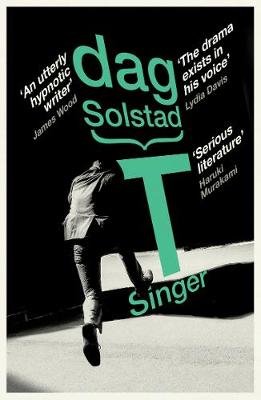
The Norwegian author Dag Solstad has been on my List of Writers to Read Eventually for quite some time. My main reason for reading this particular book right now is wanting to get a head start on some potential contenders for next year’s Man Booker International Prize (I have others lined up to read, too). Each of Solstad’s three previous novels translated into English were listed for the old IFFP, so why shouldn’t this do the same with the MBIP? (Maybe because he’ll have two eligible titles next year – the other is Armand V – but I’ll gloss over that…)
Anyway, that’s the pretext: what about the novel?
Solstad’s protagonist is outwardly unremarkable, not even receiving a full name (and the ‘T’ appears only in the book’s title). Singer feels that “his place was to be found in total anonymity”; indeed that’s where he “thrives”. He also has a detailed inner life: at the start of the novel, we are plunged into a sequence showing how Singer dwells on some of his misunderstandings, such as mistaking one acquaintance for another:
What was it he said to K, whom he thought was B? Perhaps something about how dark the room was. Perhaps something about the film (or the jazz concert) they were about to see (or hear). Perhaps some slightly joking remark about the weather, the chairs, the table, the candlelight. Perhaps a comment about a third mutual acquaintance, Y, whom K also knows, spoken in a somewhat different tone than he would have used if talking to K about Y.
(translation by Tiina Nunnally)
So it goes on, with various what-ifs around B, K and Y. I got a bit lost in the middle of this early passage, yet it was exhilarating to read. The level of detail draws everything out to the edge of absurdity, where something that might seem sensible to a character could easily be mistaken for something ridiculous (or vice versa).
The novel continues in this discursive vein as it chronicles Singer’s move to the small town of Notodden to become a librarian, which he thinks will be a good profession for attaining the anonymity he seeks. In due course, Singer falls in love with and marries a ceramicist named Merete Særthe, moving in with her and her daughter Isabella. Even this does not disrupt Singer’s sense of self, because the role of the family man is what completes his anonymity.
To begin with, Singer is quite comfortable with his tendency to keep the world at a distance; but the second half of the novel turns this on its head. As Isabella grows up, Singer finds her as distant from him as he always preferred to be from others:
But why did she behave with such intent seriousness within this childhood she’d been given, which many would say was a gift? As if the whole time she were mimicking something that she realised should have brought her delight? Singer didn’t know, but now and then he would be seized by anxiety when he saw her involved in such withdrawn activity.
I’ve sometimes seen Steve Mitchelmore refer to ‘lightness’ in fiction, meaning “the quality of great seriousness without it being overt,” (to quote a tweet of his). This kept coming to mind when I was reading T Singer, because it felt as though Solstad’s prose was skipping “like a stone across deceptively calm waters” (quoting a tweet of my own, here). For example, it hops from work to love to family with deft footwork, yet beneath that is the essential loneliness of Singer’s desire to push the world away: something that he won’t confront, in the same way that Solstad’s writing doesn’t face it directly. Then, when Singer’s distancing turns around to bite him, the same narrative technique represents the gulf between him and Isabella. Nunnally’s translation is superb in capturing the vertiginous quality of Solstad’s prose. I hope that T Singer will receive a nod in the MBIP next year – certainly it deserves to.
Read other reviews of T Singer at 1streading’s Blog; The Modern Novel; and The Complete Review.
Book details
T Singer (1999) by Dag Solstad, tr. Tiina Nunnally (2018), Harvill Secker, 263 pages, hardback (source: personal copy).
8th November 2018 at 3:10 pm
Hi David – first of all thanks for the link. Lightness is quality I value more than ever now. Solstad’s writing sometimes threatens to become knowing or smug, but there’s enough disquiet to set his novels aside from the usual stuff. For instance, that prolonged scene with Adam Eyde, the businessman Singer meets on the train to Notodden, at his mansion-like house. It reminded me of the Prince’s monologue that overwhelms the end of Bernhard’s Gargoyles, and found it very moving, perhaps solely for its random, apparently meaningless interruption of a life, which might equate to the way the narration of T Singer’s life appears in ours. It also presents as evidence of lightness.
10th November 2018 at 8:31 pm
Thanks, Steve. I’d agree with you on the Adam Eye scene: it seems in the moment that it will be significant in Singer’s life, because of how long it is and how early in the novel it appears, but it turns out not to be. I see it as an example of Solstad’s stretching and squeezing the surface experience of Singer’s life while the deeper experiences churn (or rest) beneath.